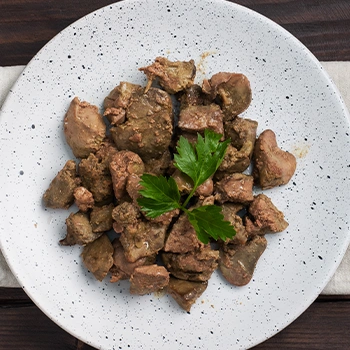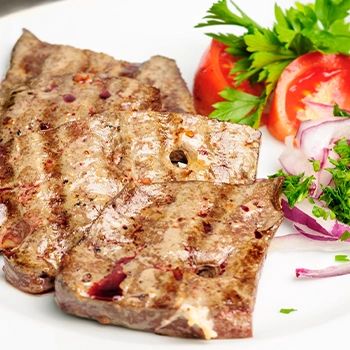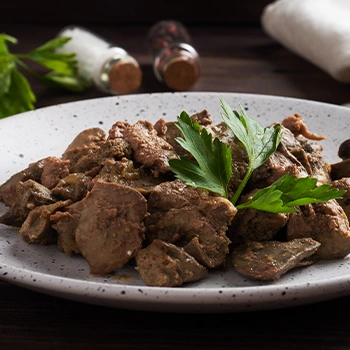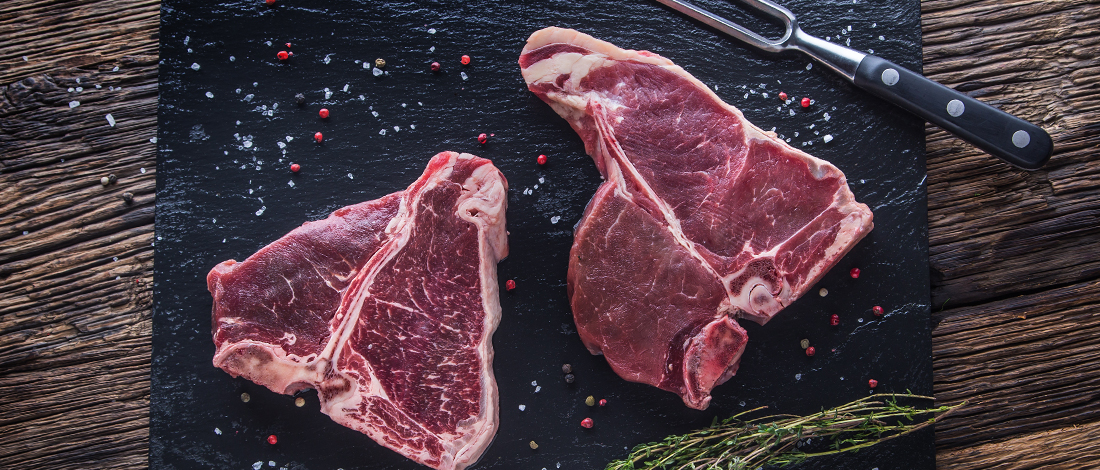Chicken and beef livers are considered delicacies worldwide and are eaten for their soft, melt-in-your-mouth texture and rich flavor.
But what differences are there precisely between these two livers? We researched the difference between these organ meats; some of our results may surprise you!
Quick Summary
- Beef and chicken livers are both nutrient-rich, offering a variety of vitamins, minerals, and macronutrients.
- Beef liver contains more vitamins and minerals than chicken liver, but also has more saturated fat.
- Consuming too much liver can lead to vitamin A and copper toxicity, so moderation is key.
Here we are, back to the same old question: chicken or beef? But now, we are focusing on their livers and their similarities, differences, benefits, and possible dangers they could offer you.
Which One Is Better: Chicken Liver Or Beef Liver?

Both beef and chicken livers are eaten worldwide and are considered delicacies.
These two organs are very similar to each other, even though they come from different animals. Both chicken liver and beef liver have the same texture and red color.
These two livers have a very similar sweet and nutty flavor profile when they are cooked, and they are both extremely nutritious food items used in many different dishes.
As these livers are very similar in these aspects mentioned above, to help you decide which one is the best for you, we will have to look at the contents and the benefits of eating liver. Let’s go through them.
Also Read: Chicken vs Duck Meat
The Benefits Of Chicken Liver

Raw chicken liver is a great organ to eat as it offers a wide array of essential vitamins, minerals, and macronutrients, so much so that it is considered a superfood.
It's small organ meat and often has a few livers in one serving, so you can be certain you are receiving all the benefits after just one serving.
This type of liver contains vitamins B12, C, A, and vitamin E, Choline, Folate, Riboflavin, Niacin, iron, and copper, which are all extremely good for you [1].
Consuming chicken liver with all these vitamins and minerals has some great benefits, including blood health due to the iron levels in chicken liver. Iron and some vitamins help prevent conditions like anemia by improving red blood cells.
Chicken liver can help weight management, depending on how they are cooked, as they are rich in high-quality protein. It means that chicken liver has a low-calorie count but is incredibly filling, which can help control your appetite.
Consuming chicken livers can help keep your heart healthy as they contain selenium.
This mineral can assist in managing and preventing cardiovascular problems like high cholesterol, stroke, and heart disease.
Adding chicken liver to your diet can help improve your eye health, cardiovascular health, and kidney function, and it strengthens your immune system, so they are great for supporting your overall health.
As mentioned, this type of liver is considered a superfood as they are filled with essential B vitamins that will assist in keeping your body healthy and functioning as it should.
The Benefits Of Beef Liver

Beef liver is also a great food to add to your diet, as beef livers are packed with macronutrients, minerals, and vitamins, making beef liver a superfood.
Beef liver is considered one of the most nutritious and healthy foods you can eat, especially if you cook it properly.
Beef liver is more substantial than chicken liver, so you are likely only to get one piece of beef liver per serving, but this organ meat serving is enough to receive all the excellent benefits from the organ meat.
Beef liver contains a substantial amount of vitamin A, various B vitamins, vitamins C, D16, K, and vitamin E. Beef liver also contains Folic acid, Iron, Copper, Magnesium, Potassium, Riboflavin, Phosphorus, Niacin, and Zinc [2].
As you can see, beef liver has a few more vitamins and minerals than chicken liver, making people consider beef liver better than chicken.
However, it would be best to remember that beef liver has more saturated fat than chicken liver, so you should not eat it as regularly. It's because beef liver is considered red meat.
Eating beef liver has the same health benefits as chicken liver, apart from weight management as it is fattier, but the rest all apply to beef liver.
A single serving of beef liver will supply you with your daily recommended amount of the mentioned nutrients, vitamins, and minerals, reducing your risk of any nutrient deficiencies.
The Possible Dangers Of Both Chicken Or Beef Liver

When people think of eating beef liver and chicken liver, they tend to become slightly concerned, as these organ meats are used by the animal’s body to filter out toxins and undesirable substances from the animal’s body.
It is an understandable concern, but it is invalid. Eating beef liver and chicken liver is perfectly safe in this regard.
However, the problem comes with the vitamins. Chicken and beef livers have a high amount of vitamin A.
If you consume too much chicken or beef liver, it can lead to vitamin A toxicity, also known as hypervitaminosis A.
Because Vitamin A is fat-soluble, it's stored in the human body in excess, leading to vitamin A toxicity.
Symptoms of vitamin A toxicity include nausea, vomiting, vision problems, and bone pain, with an increased risk of fractures occurring.
Chicken and beef liver also contains a high level of copper, so if you consume too many in one sitting, you have a chance of developing copper toxicity, also known as Copperiedus.
It is a form of metal poisoning, and the symptoms include vomiting, hypotension, hematemesis (vomiting blood), jaundice, melena (tarry or black feces), and gastrointestinal distress.
Copper poisoning from the beef liver and chicken liver can be extremely dangerous, so please seek medical attention if you exhibit these symptoms after consuming livers.
So, if you consume beef or chicken liver regularly, there is no need to look for copper from other food sources.
Consuming a large amount of beef liver, in particular, can lead to these dangers more than chicken liver. Beef liver is more substantial and contains these vitamins and minerals in higher quantities.
It is important to remember that these dangers will only arise if you're eating beef liver and chicken liver too much in one sitting.
So, even though beef and chicken liver are highly nutritious and incredibly healthy, you should not be consuming them daily.
Eating chicken or beef liver once per week is sufficient to gain the benefits.
Chicken Liver vs Beef Liver: Which One Is Better?

As you can see, both beef and chicken livers have great benefits and are very nutritious. However, they have possible dangers if you consume too much in one sitting.
However, if you want to ensure you get the most nutrients, minerals, and vitamins in one meal, consider eating beef liver, as it contains a higher amount of these nutrients than chicken liver. It helps improve your red blood cells and overall cardiovascular health.
But if you are trying to manage your weight and improve your immune system, you should instead go for a chicken liver as they are less fatty and still contain many essential nutrients and high-quality protein.
Related Article:
References:
- https://www.webmd.com/diet/health-benefits-chicken-liver#1
- https://www.webmd.com/diet/liver-good-for-you#1







